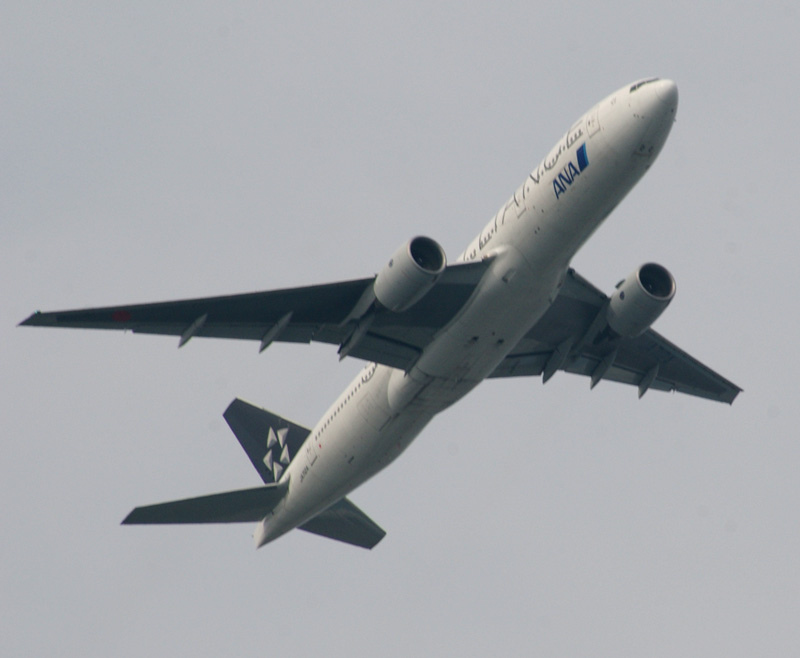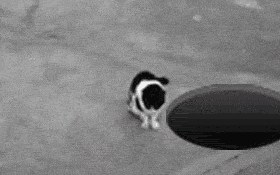Flying for Free: My Inside Story About What it Really Takes To Get Free Flights
Take a minute to look at what it really takes to fly for free, based on the experience of a real globetrotter: Yours truly.

photo credit to Nachans via Flickr
I travel a lot.
As an expat who spent more of the last 10 years living outside of America in it, I know a thing or two about getting the best deals on plane tickets. I've flown for free myself, using loyalty programs offered by the airlines even without a credit card. However, I've noticed a lot of people are putting bad information out there about how miles credit cards really work and how to get free flights. That's why I decided to lift the veil for you right now and show you the hidden secrets behind what it really takes to fly for free. If you don't know what you're doing and jump right into trying to get a lot of miles blindly, you could waste a lot of time and not get anything out of it.
You can earn miles in 2 different types of programs.
I'm gonna start out by explaining there are two different kinds of loyalty programs that airlines offer, even though a lot of people confuse them.
The one that I prefer to use myself is an airline-rewards program where all you get is a cute little card with your name on it and your little membership ID number. That's it. It's just a card to show you're part of their little club, and every time you fly, they give you back a little bit of credit in the form of "miles points." When you fly often, this kind of rewards program will give you a free flight without requiring you to do anything else other than travel. I like it because there are no strings attached. You fly, earn miles, use them whenever you want. That's the end of the story. With this scheme, you have nothing to lose. The only catch is that if you want a free flight from this scheme, then that means you're going to have to make several big international flights -- paid out of your own pocket -- in less than a year. Otherwise, your miles will end up expiring or losing value over time. That means you won't be able to cash them in anymore.
Credit cards that offer you mileage points on different airlines are the other popular scheme for winning a free plane ticket. Since this one is a lot more complex, we're going to spend more time talking about how this one works, why its future looks very bright and how you can take advantage of it to get free flights without falling into the hidden traps along the way. The basic concept of mileage credit cards is that every time you spend money on qualifying purchases -- which can often be in your daily life and don't necessarily have to be the big expenses -- then your spending helps you earn mileage points toward getting a free ticket or a discount on other travel expenses like hotels, rental cars and all that. The more you use your credit card, the faster you win a free plane ticket.
Quick summary of the Pros and Pitfalls of each scheme:
If you enroll in an airline's rewards program that issues you only a membership card, not the credit card, then unfortunately you have to be really frequent flyer to see benefits here. While no real risk is involved, I had to take 3 separate 12-hour-long international flights in less than a year on Singapore Airlines and its affiliates before I earned myself a free flight, and the flight I won was very small. It was a return ticket for a flight only 4 hours long going between India and Singapore, and I still had to pay tax on my "free ticket." If you fly less than three times a year on most airline-reward programs, then you probably won't earn enough miles to pay for hardly anything or get even close to winning a free plane ticket.
On the other hand, the mileage credit card scheme has a lot more potential because you can earn miles points without even flying. It also involves a lot more risk because your own credit history is at stake. The Globetrotters that I've interviewed for the purposes of this article have all dived into this game at varying levels. If you get really extreme about it, then you really can fly for free all over the world just by playing the "credit-card miles game," as I like to call it. One of my friends has done this for several years now, and he's got almost 30 different miles-program credit cards. The catch is that you have to treat your credit-card miles game the same way you treat a part-time job. You have to research it inside and out. You have to understand exactly the terms and conditions of every cardholder member agreement, and you have to stay on top of exactly what dates your initial offers are going to expire and interest rates are going to rise.
What does it take to master this game?
You have to play each credit-card company against each other. For example, every single credit card mileage program will give you a signing bonus of so many thousands of free miles just for opening up your new line of credit with them. It's a simple marketing tactic to get you to use that card. Then they usually offer a low introductory interest rate
... but after that period of time, the interest rates will jack up really high really fast.
They often also offer free balance transfers. Start by buying a plane ticket with one rewards credit card that offers no interest payments for the first 6 months. You cash out a little by using these free "welcome gift" miles to buy something else that can get you -- yep, even more miles. Now you're happy because you get faster rewards and buy your first plane ticket for practically nothing. Then you can wait until the 6 months are almost over, get another rewards credit card with a similar offer and transfer the balance from the discounted ticket you bought onto the new card. Now the amount you paid for that plane ticket will just sit there not collecting interest for as long as you continue opening new accounts and transferring balances between new credit cards. You can pay it off at any time without any extra penalties and no interest, if you're careful. Meanwhile, just the fact that you bought a ticket with the mileage credit card earns you more miles on top of that, so the miles start compounding. You can easily see how when you add in the factor of getting more mileage points from grocery shopping, getting gas or sometimes any other way that you use your credit card, you can rack up a lot of points really quickly. Then to make even more points, you get a joint account with a friend or relative that you trust. That means every time you both use the card linked to the same account -- and you use it often -- then you can continue earning points together all the time. You can move money almost endlessly to keep saving. Some people developed elaborate schemes where they use their mileage cards to buy gift certificates "for others" and then find loopholes to redeem the certificates themselves without losing any money and still earning points. The bad news is that the credit-card companies aren't stupid, and they have caught onto some of these plans, which is why masters of the credit-card mileage game study it religiously. The rules on what kind of spending qualifies for how many points Literally Change All The Time.
You can read several more guides into how this works in more detail here:
http://zerototravel.com/trade-for-travel/beginners-guide-travel-hacking/
https://www.nerdwallet.com/blog/top-credit-cards/nerdwallets-best-airline-credit-cards/
But Wait A Minute...
It's time to ask the harder questions though. Why do so many airlines and credit card companies offer these kinds of awards programs? Are they losing a ton of money from this? And why don't I subscribe to this plan myself?
I'm glad you asked because here's where it all starts to get really interesting. Let's jump down the rabbit hole!

1. Why do they do it anyway?
Obviously, we know they're making money from this mileage business, or they wouldn't be doing it. But how? Well, it's not how you think.
I'd sum it up by saying:
The airlines want a financial safety cushion of steady income, so they decided to "get in bed" with some banks and credit-card companies. Now they like it in that bed so much that they might never move out.
Facts:
The card issuers and other businesses are the ones who actually "award" free flights. Miles transactions include three parties. Banks buy miles in bulk at a discounted rate from the loyalty program, not from the airline directly. Even more shady is the fact that:
The actual value of the miles can and does change at any given time according to the goals of the vendors.
The airlines get their money from the banks and the loyalty program they partner with every time someone redeems miles for a plane ticket. In the end, the miles are just a currency medium between the banks and the airlines' affiliates. The bulk sales of an airline's miles to the banks do bring in a steady income, but an airlines always wants to just sell more tickets rather than miles.
Wait; it gets better and much more convoluted.
A former airline employee named Mr. Larroulet explains that actually, there are three different rates per mile to consider when looking at how an airline profits from miles programs. He says that:
" ... purchasing miles, earning miles and redeeming miles are accounted with different cents-per-mile costs [to] make the frequent-flyer program profitable ... and the airline's operation profitable because award seats get paid to the airline in real money."
Only considering that three parties -- the bank, the airlines and the frequent-flyer program entity -- work together in these miles deals can explain why airlines continue to profit from offering miles deals that sometimes seem unprofitable on the surface.
2. Now you can understand why this crazy statement is actually true, explaining why they are NOT losing a ton of money from this.
In a Skift.com special report, the interviewer went over the numbers of miles sales with a senior-level executive who was actually happy with people purchasing hundreds of thousands of miles for free flights to save money on first-class tickets that would otherwise cost at least a thousand dollars more.
The bottom line is that they " ... make money selling miles at a higher price than it costs to redeem the miles. That’s even true knowing that the miles are going to be used for more expensive awards.”
Important Sidenote:
I've recently been seeing a lot of buzz about "Is it true that airlines make more money selling miles than seats?" I felt up for the challenge of researching it, and this is what I found:
Bloomberg published a report in the spring of 2017 describing that airline-branded credit cards and miles programs are absolutely vital to keeping the airline industry afloat. Reporter Justin Bachman quotes heavily from Joseph DeNardi, an airline analyst from Stifel Financial Corp. who argues that corporations have undervalued the airlines' profits from miles programs. DeNardi claims that:
"Airlines are earning upward of 50 percent of [income] from selling miles to a credit-card company, which we believe is a great business to be in.”
On the other side of the argument, Gary Left from BoardingArea.com states that this idea is not the whole truth of the matter by saying:
" ... while airline-mileage sales have higher margins than transportation, and mileage programs at times have been the only profitable piece of airlines, it’s not unambiguously clear that airlines have been making more money selling miles than selling flights in recent years because as the price of fuel has fallen, the transportation component has gotten more profitable."
How much do airlines really make in miles sales vs. traditional flights?
While Bloomberg's report claimed that "each mile fetches an airline anywhere from 1.5 cents to 2.5 cents," Mr. Left shared in his research that the " ... price has ranged from 1.23 to 1.32 cents per mile."
Further complicating the matter is that while it's easy to determine the cost of today's customers in buying miles vs. buying a ticket without miles, no one except the airlines companies themselves can say how much profit they are actually making from their miles programs. Therefore, all the numbers brought up so far come purely from speculation.
Even DeNardi, who believes the airlines is attracting huge profits from miles programs, admits that he doesn't have the exact figures himself. In his report he says Andrew Levy, United’s finance chief, "isn’t ready to disclose its Mileage Plus numbers." All he knows is that when United declared bankruptcy from 2002 through 2005, their mileage program posted profit margins of up to 45 percent. This type of financial report became private again from 2006 onward. However, knowing someone's profit margin alone is not enough to determine their total income from the program because you don't know how many miles they sold. Bank deals always include confidentiality clauses. Carriers won't show competitors any detailed information about the loyalty-program's profits because it's bad for business.
The Bloomberg report cited that "Delta Air Lines Inc. ... expects that its American Express partnership will yield $4 billion in revenue per year by 2021," but that figure is just a projection, not a fact set in stone. Besides that, even $4 billion per year doesn't seem like much when one takes into account that American Airlines Groups' official total revenue from passengers in 2016 was $18.2 billion dollars, much of which goes into covering the billions of dollars of operating expenses.
The bottom line is that no one can prove that airlines make more money selling miles than seats -- but sure, miles programs are big bucks for them.
It's impossible to declare exactly how much any one airline makes in total profits from their miles-program business dealings because that information is confidential and likely to remain so. The whole point for an airlines of using miles programs was to create supporting revenue from the banks who back the credit cards, which can also create more loyal customers for both the airlines and the bank.
Besides, let's use common sense as to if airlines would really profit more from selling miles vs. seats:
Scenario A) If someone buys a ticket directly from the airline without using miles, then the airline is the only one to profit. Therefore, an airline still stands to gain more profit without relying so heavily on miles programs. The airlines makes more money from dealing their miles to banks than to individual people.
Scenario B) If someone buys a ticket with miles, which actually their credit-card company has awarded them, then the profit split goes between the airlines, its associate loyalty program and the bank. Even if the profit margin was larger this way, splitting it three ways is not likely to make more money for the airlines.
Here's why you can expect the trend of "money-making miles programs" to continue:
Evidence suggests that banks aren't likely to back out of supporting miles programs anytime soon. In fact, banks are more than happy to back airline-miles cards because they attract those with better credit histories.
According to the surprising chart shown here on Miles.com for example, to receive approval for a Gold Delta SkyMiles credit card from American Express, the average credit score a customer should have is 675, or 624 at the lowest. The good news is that the average American's credit score has gone up steadily since 2008 according to data shown at WalletHub.com. However, their data also shows that the only people likely to have such a credit score are those above the age of 35. These are people with more stable jobs who are likely to be reaching the height of their careers, people who are more financially conscious because they have more responsibilities like families to support. Ironically, these are also the same people who probably don't have much vacation time available to travel anyway. _They're also therefore more likely to earn lots of miles, pay their bills and never use the miles ... so the miles will expire and go right back into the pockets of the banks and/or airlines loyalty program as free profit. _
3. Finally, here's what you need to watch out for, which is why I'm cautious with miles credit cards:
If you don't have a big master-planning schedule for your wallet full of mileage cards so that you know exactly what your balances are and when your interest-free periods end, then you're walking into a big mess of debt. Creditors are so sneaky that they will continue charging you compound interest on any purchase you ever made EVERY MONTH for as long as you have any balance on your credit card. They want to give you bad spending habits.
You have to invest a serious amount of time into miles juggling, which is not fun for a lot of us. Then just when you get the hang of it, the rules change again because the banks are catching on.
If you spend lots of time abroad like I do, you pay for most things in cash anyway. You can't exactly rack up a bunch of miles on a credit card when you primarily use cash. International cash-advance fees are the worst, BTW. Besides, some of the most amazing places in the world I've ever seen definitely do not take credit cards. But hey, if someone else shares your account back at home and wants to keep spending there to help you earn miles when you're abroad, then great.
(P.S. I'll reply to every person who tells me if they prefer being called a "steemian," "steemer," "steemite," "steemster" or "steemoid" -- Or some other creative phrase designating your "SteemIt" origins ... just because I appreciate you reading this entire post. 😎)

nice and informative post !
Call me STeeminaTor :)
Thank you

Ok, Steeminator! I think we'll make great friends. 😎
ill hope so ! have a blessed Sunday
Cheers ma girly-friend 😎
Thanks!
You know, I also love making smoothies, so I entered this week's Steemit Culinary Challenge and created a killer pomegranate & mangosteen & banana smoothie with coconut milk. It's totally vegan, so I thought you'd enjoy it. Check it out here and tell me if you like it.
Congratulations @joylovestowrite! You have completed some achievement on Steemit and have been rewarded with new badge(s) :
Click on any badge to view your own Board of Honnor on SteemitBoard.
For more information about SteemitBoard, click here
If you no longer want to receive notifications, reply to this comment with the word
STOPBy upvoting this notification, you can help all Steemit users. Learn how here!